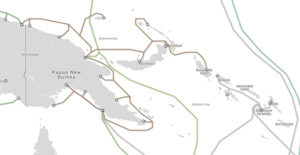Satellites are the new frontier for internet connectivity, and that’s going to benefit businesses in Papua New Guinea as the country gets serious about cloud computing, technology entrepreneur and futurist Mark Pesce tells Business Advantage PNG.
‘As we speak,’ says futurist Mark Pesce, ‘tech billionaires are fighting out a battle in the skies to provide the best satellite broadband across the globe.
‘And it’s all going to benefit countries and businesses in places like Papua New Guinea.’
Late last month, the Starlink network owned by Elon Musk’s Space-X, put 60 satellites into orbit. When completed, the full Starlink network will consist of 11,943 satellites.
Musk’s SpaceX isn’t the only company trying to launch a mega-constellation of internet-providing satellites. OneWeb, which is backed by Richard Branson’s Virgin and Qualcomm, launched its six satellites in February this year.
In New Zealand, the Los Angeles-based commercial spaceflight company Rocket Lab, has built the world’s first private launch complex for orbital space flights, and Jeff Bezos, CEO of Amazon, says his Blue Origin company will provide multiple launches on its yet-to-be-built rocket to get Telesat’s spacecraft into Low Earth Orbit, or LEO.
Telesat already operates a 17-satellite telecommunications constellation in Geostationary Earth Orbit, or GEO, but it’s planning to put hundreds more satellites in LEO, providing high-speed internet access to an estimated 4 billion people around the world who are currently underserved.
‘One of the fundamental principles of design for people who are developing networks is to have no single point of failure.’
‘Within five years,’ says Pesce, ‘there will be multiple, much lower cost satellites offering broadband internet access, so there’s going to be a lot competition for subscribers.’
Connecting PNG to the world

Map showing planned and existing undersea cables surrounding PNG and the Solomon Islands. Credit: Telegeography
PNG is already serviced to some extent by medium orbit 03b satellites, provided through SES Networks, which augment existing fixed line and microwave services. These have shown themselves particularly effective for special events such as APEC 2018, and natural disasters such as the recent 7.2-magnitude earthquake that struck near Bulolo in May.
Two new undersea cables—the Coral Sea Cable and the H2 cable—in the Pacific will add access to the internet, and more importantly, increase reliability.
‘One of the fundamental principles of design for people who are developing networks is to have no single point of failure. They want to have multiple points of connections into the country so that if one connection fails other connections can pick up the slack,’ notes Pesce.
‘PNG is nowhere near that yet. I would say it’s good to have multiple cables coming in, at multiple points. Again, because of weather, because of an earthquake or because of who-knows-what, you want to be able to have redundancy and you want it to be spread out across the country rather than concentrated at a single point.’
Until then, he says, many businesses are likely to remain uncomfortable about taking advantage of what the Internet has to offer, particularly the storage, managing and processing of data on remote servers.
Using the cloud
‘When you sign up to cloud usage through an internet provider, you are given a Service Level Agreement, or SLA, and they will provide you with a certain amount of down-time which is generally given in nines. So, three nines are 99.9 per cent, or 10 hours a year, while four nines represent about one hour of down time a year.’
‘You really do have to think about that aspect when you’re negotiating with an Internet Service Providers (ISPs) and ask whether any provider in PNG is prepared to offer that agreement, offer that kind of stability.’
Pesce also noted that cloud security was no longer the issue it once was, as there are regulatory frameworks which fine ‘or even criminally charge’ companies which do not comply with security issues.
Australia last year adopted new data breach laws, ‘which are among the first in the world’; and he says the PNG regulators are probably currently examining to see how breach laws will be adapted to the PNG environment.
Mark Pesce will be speaking at Business Advantage’s Papua New Guinea Investment Conference, to be held at the Shangri-La Hotel in Sydney, 19 and 20 August









Speak Your Mind